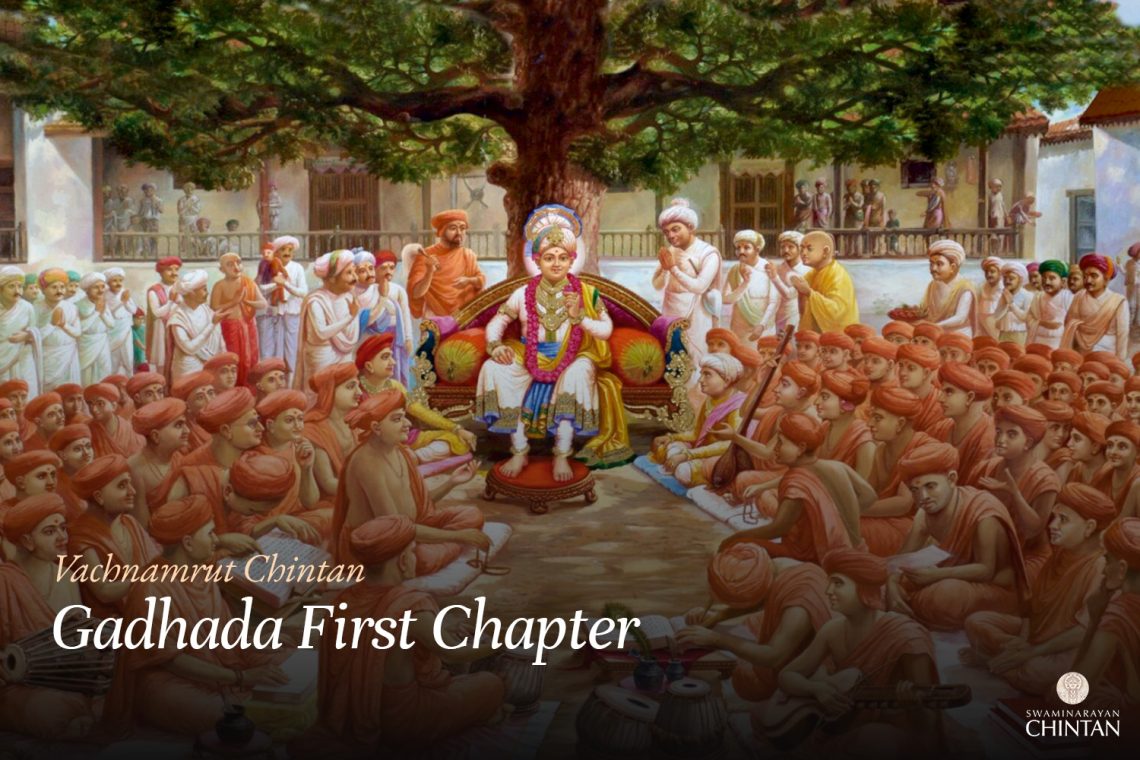Central Insights:
- The True Nature of Violent and Non-Violent Dharma
Key Points:
- On Sacrifices and Violent Dharma: Sacrifices involving animal killing are considered acts of dharma. Dharmas that involve violence are driven by material wealth (artha) and desire (kāma).
- On Non-Violent Dharma: Non-violent dharmas are dedicated solely to liberation (moksha).
Explanation
In this Vachanamrut, Shriji Maharaj posed a question: What is the definition of dharma? Provide an answer according to the scriptures. Even the violent kings who came for refuge would neither kill a living being nor allow others to kill. Thus, those who sought refuge were neither killed nor allowed to be killed, but those who did not seek refuge were killed by the king himself. Would the scriptures consider such a king dharmic (righteous) or not? The kings adhered to the Vedas, as the Vedas in certain places prescribe violence. Phrases such as
अग्निषोमीयो पशुमालभेत
agnīṣomīyaṁ paśum ālabheta
आततायी वधे दोषो नास्ति
ātatāyī vadhe doṣo nāsti
या वेदविहिता हिंसा न सा हिंसा
yā vedavihitā hiṃsā na sā hiṃsā
indicate that violence prescribed by the Vedas is not considered sinful. Would such a king be regarded as dharmic by the scriptures? The sages could not answer this question.
Therefore, the sages asked Maharaj: In the Vedas, both violent and non-violent practices are prescribed. Please explain them as they are. Maharaj answered that the essence of the Vedas is entirely focused on non-violence. The mention of violence is intended to limit it. Dharmas that include violence are not for ultimate welfare, whereas non-violent dharmas are aimed at ultimate welfare.
The world functions on the principle of “Live and let live,” but the scriptural principle is not जीवो जीवस्य भोोजनम्— jīvo jīvasya bhojanam, meaning one living being exists as food for another. Instead, the true scriptural principle is जीवो जीवस्य जीवनम् — jīvo jīvasya jīvanam, meaning one living being serves as the support for another.
This conveys the idea that life is sustained through mutual cooperation, not through predation. The essence of this teaching is that we are meant to be protectors, not predators—to assist one another, not exploit others for personal gain.
The True Meaning of Self-Defense
The principle of discretion and righteousness applies specifically to humans. Every individual has the right to self- defense, and protecting oneself is not an act of wickedness; rather, it is a fundamental right. However, self-defense must never come at the cost of harming others unjustly. If one protects oneself by causing harm to the innocent, it is no longer self-defense—it becomes violence and the path of the wicked.
Thus, to harm others for personal benefit or selfish motives is nothing short of pure evil. While everyone has the right to safeguard their own well-being, using that right as an excuse to oppress, exploit, or harm others is unacceptable. If self-preservation comes at the expense of another’s suffering, it is no longer righteousness (dharma), but rather a betrayal of morality and humanity.
Now, there arises a doubt: A person who follows the path of renunciation can practice the non-violent dharma as described above, but how can householders and especially aspiring kings, who must manage many people and maintain order, do so without violence? How can good governance occur without punishment? Thus, violence seems inevitable, and without it, there can be no welfare. What should be done then? The solution is that governance and guiding many people towards God is not considered wickedness. In the Bhagavad Gita, the king is called God’s vibhuti (divine manifestation) and a part of God. Shreeji Maharaj also mentioned in the Vachanamrut that guiding many people towards God is not wickedness.
Shreeji Maharaj says, even in such situations, violence is not inevitable. Non-violence can be practiced. King Yudhishthir ruled thousands of miles of land, King Uprichar was the emperor of the earth, and King Ambrish was also an emperor. They ruled their kingdoms completely non-violently. Maharaj says there are many like Bhimasen who instil fear and punish, but that is not wrong. However, maintaining saintliness is rare. Moreover, governance through punishment and good governance without punishment is possible.
Historically, compassionate kings governed their subjects with love, superior conduct, exceptional character, and fatherly affection. This is true governance, referred to as Ramrajya (the ideal reign of Bhagwan Ram). The situation requiring punishment arises only when the leader lacks virtues and must compensate for the lack of virtues through punishment. Therefore, Maharaj says that a sant should not harbour ill will towards anyone, should not be arrogant, and should live as the servant of servants. Anger is the trait of the wicked, and living with a calm nature is the trait of the virtuous. In this world, there is no shortage of fiery-tempered people like Bhimasen. Being a sant is the most difficult and rare quality.
Glossary
| Anger – A trait associated with wickedness. |
| Live and Let Live – A principle promoting mutual support rather than harm among living beings. |
| Moksh – Liberation from the cycle of birth and death. |
| Non-violent Dharma – Dharma aimed solely at ultimate welfare and liberation (moksha). |
| Satsang – Association with santos or spiritually uplifting individuals. |
| Self-Defense – The right to protect oneself without causing unnecessary harm to others. |
| Upaya – Means the method or strategy to achieve a righteous goal. |
| Violent Dharma – Acts prescribed by Vedas that involve violence for specific purposes like sacrifices. |
| Wicked Person – Someone who causes harm to others for personal gain or out of arrogance. |
| Wickedness – Actions involving harm to others for personal gain or out of ill will. |

